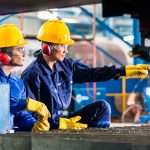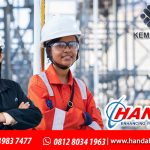
In today’s competitive industrial landscape, occupational health and safety (OHS) has become a top priority for organizations worldwide. As industries such as oil and gas, mining, petrochemicals, and manufacturing continue to grow in Indonesia, the demand for skilled professionals with internationally recognized safety qualifications is rising significantly. Among the most prestigious and sought-after certifications in this field is the NEBOSH (National Examination Board in Occupational Safety and Health) qualification from the United Kingdom.
For professionals in Indonesia who aspire to advance their careers and organizations seeking to enhance their safety culture, NEBOSH training provides a clear gateway to meeting international safety standards. This article explores the significance of NEBOSH training in Indonesia, its benefits, available qualifications, and why Handal Training is one of the best choices for those pursuing excellence in workplace safety.
Understanding NEBOSH and Its Global Recognition
The National Examination Board in Occupational Safety and Health (NEBOSH) is a globally recognized awarding body that offers qualifications designed to improve health, safety, and environmental management in workplaces. Founded in 1979 in the United Kingdom, NEBOSH has built a reputation for providing rigorous, internationally respected certifications that are recognized by employers, professional bodies, and regulatory authorities worldwide.
More than 400,000 people across the globe have achieved NEBOSH qualifications, making it one of the most widely recognized standards for health and safety professionals. In industries where compliance with both local and international regulations is essential, NEBOSH provides credibility and ensures that professionals are equipped with the right knowledge and practical skills.
Why NEBOSH Training Matters in Indonesia
Indonesia’s growing economy heavily relies on industries such as oil and gas, mining, construction, and petrochemicals—sectors that involve high-risk operations. The Indonesian government has emphasized the importance of occupational safety and health (K3) to reduce workplace accidents and align with global standards.
By pursuing NEBOSH training in Indonesia, professionals can:
-
Meet international standards: Gain qualifications that are respected across the world.
-
Improve career prospects: Open doors to senior safety roles in both local and global companies.
-
Support compliance: Help companies meet Indonesian regulations while also adhering to international benchmarks.
-
Enhance workplace safety culture: Contribute to reducing accidents, improving employee morale, and boosting productivity.
For organizations, hiring employees with NEBOSH qualifications ensures that safety practices align with global expectations, making Indonesian companies more competitive internationally.
Types of NEBOSH Qualifications Available
NEBOSH offers a variety of qualifications tailored to different levels of expertise and professional goals. Some of the most relevant for Indonesian professionals include:
1. NEBOSH International General Certificate (IGC)
The IGC is one of the most popular and widely recognized NEBOSH qualifications. It is ideal for supervisors, managers, and professionals who need a broad understanding of occupational safety and health. Topics include hazard identification, risk assessment, and implementing effective control measures.
2. NEBOSH International Technical Certificate in Oil and Gas Operational Safety
Specifically designed for the oil and gas sector, this certificate addresses health and safety issues unique to upstream and downstream operations. Given Indonesia’s strong oil and gas industry, this qualification is highly relevant.
3. NEBOSH Process Safety Management (PSM)
This qualification focuses on preventing catastrophic incidents associated with hazardous processes. It is especially relevant for industries such as petrochemicals, refining, and manufacturing.
4. NEBOSH Environmental Management Certificate
For professionals looking to specialize in environmental protection, this certificate provides knowledge on environmental risk management, sustainability, and compliance with environmental laws.
These programs not only enhance individual competence but also provide organizations with trained professionals capable of managing safety risks effectively.
Benefits of NEBOSH Training for Professionals
Completing a NEBOSH qualification provides long-term career and personal development advantages:
-
Global recognition: Employers across the world trust NEBOSH qualifications.
-
Career advancement: Many organizations require NEBOSH certifications for managerial or supervisory safety roles.
-
Practical knowledge: The training emphasizes real-world applications rather than just theory.
-
Professional memberships: Holders of certain NEBOSH certificates can join respected organizations like IOSH (Institution of Occupational Safety and Health).
-
Enhanced confidence: Professionals gain the ability to lead safety initiatives with authority and competence.
The Role of NEBOSH in Indonesian Industry
Workplace safety in Indonesia remains a crucial issue, particularly in sectors involving hazardous operations. Reports from Indonesia’s Ministry of Manpower emphasize the need for stronger safety practices to reduce the rate of occupational accidents.
NEBOSH training complements local regulations by equipping professionals with advanced tools to assess risks, implement controls, and maintain compliance with both national and international standards. This dual advantage strengthens companies operating in Indonesia, allowing them to compete globally while protecting their workforce.
Why Choose Handal Training for NEBOSH Courses in Indonesia?
When it comes to pursuing NEBOSH training, the choice of training provider is as important as the qualification itself. Handal Training, a division of PT. Handal Wira Mandiri, is among the leading providers of professional training in Indonesia.
Here’s why Handal Training stands out:
-
Accredited provider: Handal Training is an approved NEBOSH center, ensuring the highest quality of education.
-
Experienced instructors: Trainers with extensive industry backgrounds bring real-world insights to the classroom.
-
Industry focus: Specialization in oil and gas, petrochemicals, energy, and heavy industries makes Handal Training particularly relevant for professionals in these sectors.
-
Comprehensive approach: The training combines theoretical knowledge with practical applications to ensure participants are fully prepared.
-
Proven track record: With more than 20 years of experience, Handal Training has worked with leading companies in Indonesia and across the region.
For more details on upcoming NEBOSH training schedules and registration, visit Handal Training.
How NEBOSH Training Shapes the Future of Safety in Indonesia
As Indonesia continues to develop its industrial sector, the role of highly qualified safety professionals becomes even more vital. By investing in NEBOSH training, individuals not only advance their careers but also contribute to creating safer workplaces that meet global expectations.
For organizations, employing staff with NEBOSH qualifications strengthens compliance, reduces risks, and builds trust with international partners. In an increasingly interconnected global market, having a workforce trained to international safety standards is not just an advantage—it is a necessity.
Conclusion
NEBOSH training in Indonesia provides the perfect opportunity for professionals to align themselves with international safety standards while enhancing their career prospects. With industries like oil and gas, petrochemicals, and mining requiring highly skilled safety experts, the demand for NEBOSH-qualified professionals continues to grow.
By choosing an accredited and experienced provider like Handal Training, professionals in Indonesia gain access to world-class instruction, practical insights, and the recognition needed to thrive in a global safety environment.
Investing in NEBOSH training today is not only a step forward in personal and professional growth but also a contribution to building safer, more productive workplaces across Indonesia.



